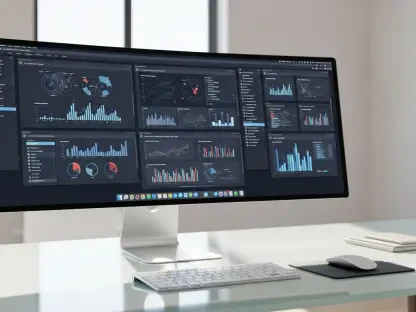In an era where data breaches and inefficiencies plague enterprises, the managed file transfer (MFT) industry stands at a pivotal moment, grappling with skyrocketing global data volumes and increasingly sophisticated cyber threats. Businesses face mounting pressure to secure sensitive information while maintaining operational agility, a challenge underscored by a staggering statistic: over 80% of organizations report struggling with outdated file transfer systems that hinder scalability and expose vulnerabilities. This sets the stage for innovative solutions like Progress Software’s newly launched Automate MFT, a cloud-native platform designed to redefine secure data movement for modern enterprises. This report delves into the state of the MFT industry, key trends, challenges, and the transformative potential of such advancements.
Overview of the Managed File Transfer Industry
The MFT industry plays a critical role in enabling secure, reliable data movement across enterprises, ensuring that sensitive information is transferred without compromise. As businesses increasingly rely on digital ecosystems, MFT solutions have become indispensable for safeguarding transactions, protecting intellectual property, and maintaining customer trust. From financial institutions handling payment data to healthcare providers managing patient records, the ability to transfer files securely is a cornerstone of operational integrity.
Currently, the industry is experiencing robust growth driven by the exponential rise in data volumes and the corresponding need for efficient transfer mechanisms. Organizations are seeking tools that not only handle large-scale data but also integrate seamlessly with existing systems. This demand has spurred competition among major players like Progress Software, IBM, and Axway, while segments such as on-premises and cloud-based solutions cater to diverse needs. The advent of technologies like artificial intelligence and automation is further reshaping the landscape, promising enhanced efficiency and reduced human error.
Beyond technological advancements, regulatory compliance significantly influences MFT practices, especially in sectors like finance and healthcare. Standards such as GDPR and HIPAA mandate stringent data protection measures, pushing companies to adopt solutions that offer robust encryption and audit trails. As the industry evolves, the convergence of security, scalability, and compliance remains a key focus, positioning MFT as a linchpin in the broader digital transformation journey.
Industry Trends and Market Insights
Emerging Trends in MFT Solutions
A notable shift in the MFT landscape is the growing preference for cloud-native SaaS platforms over traditional on-premises systems. This transition is fueled by the flexibility and scalability that cloud solutions offer, allowing businesses to adapt to fluctuating workloads without heavy infrastructure investments. Enterprises are increasingly drawn to platforms that minimize the need for extensive hardware maintenance, freeing up resources for strategic initiatives.
Automation is another transformative trend, reducing reliance on manual processes and fragile scripts that often lead to errors and downtime. The integration of AI-driven strategies is accelerating business velocity by optimizing workflows and predicting potential disruptions before they occur. Additionally, cybersecurity has taken center stage, with organizations prioritizing MFT tools that embed advanced security features to combat evolving threats like ransomware and phishing attacks.
Consumer behavior is also evolving, with a clear demand for user-friendly and scalable tools that require minimal technical expertise. This shift opens new opportunities for innovation, particularly in hybrid IT environments where businesses operate across cloud and on-premises setups. Solutions that bridge these environments while maintaining ease of use are poised to gain traction, reflecting a broader push toward accessible technology.
Market Data and Growth Projections
Recent market data highlights the MFT industry’s upward trajectory, with cloud-based solutions experiencing adoption rates that outpace traditional systems by a significant margin. Industry reports indicate a compound annual growth rate exceeding 10% for SaaS-based MFT platforms from this year through 2027, driven by their cost efficiency and enhanced security features. This trend underscores a pivotal shift in how enterprises approach data transfer.
Focusing on key players, Progress Software (NasdaPRGS) demonstrates strong market positioning, with analyst price targets ranging from $50.00 to $75.00, reflecting confidence in its strategic direction. Stock performance remains stable, supported by positive ratings from firms like Citigroup and Wedbush, which see innovations such as Automate MFT as catalysts for growth. Such financial indicators suggest a favorable outlook for the company amidst competitive pressures.
Looking ahead, forecasts predict continued expansion of SaaS-based MFT solutions as businesses prioritize operational agility and compliance. The drive to reduce costs while addressing security demands will likely accelerate adoption rates, especially among small and medium-sized enterprises entering the digital space. This growth trajectory points to a future where cloud-native platforms dominate the market, reshaping enterprise data strategies.
Challenges in Modern File Transfer Systems
Despite advancements, the MFT industry grapples with significant hurdles, primarily tied to aging infrastructure. Many organizations still rely on legacy systems that are not only costly to maintain but also lack the scalability needed for today’s data demands. These outdated setups often result in inefficiencies, hampering productivity and increasing the risk of operational bottlenecks.
Technological challenges compound the issue, with fragile scripts and manual processes posing risks of errors and system failures. Security vulnerabilities in older systems are particularly concerning, as they provide entry points for cyber attackers in an environment where data breaches can have catastrophic consequences. Addressing these gaps requires substantial investment, which can strain budgets already stretched thin.
Market-driven pressures add another layer of complexity, as the high operational overhead of on-premises solutions burdens organizations with ongoing expenses. Transitioning to modern alternatives like cloud-native platforms offers a viable path forward. Tools such as Automate MFT, with their focus on automation and reduced maintenance, present strategies to overcome these obstacles, enabling businesses to modernize without sacrificing reliability.
Regulatory and Compliance Landscape
The regulatory framework governing the MFT industry is stringent, with standards like SOC 2 Type 1 and HIPAA setting high benchmarks for data protection. These regulations are particularly critical in sectors such as finance and healthcare, where non-compliance can result in severe penalties and reputational damage. Ensuring adherence to these rules is not just a legal obligation but a competitive necessity.
Security features play a pivotal role in meeting compliance demands, with encryption and multi-factor authentication becoming standard expectations. Solutions that embed these capabilities, like Automate MFT, help organizations safeguard sensitive information while maintaining detailed audit trails for regulatory reviews. This alignment with legal requirements builds trust among stakeholders and clients alike.
As data protection requirements tighten globally, regulatory changes continue to shape industry practices. The push for stricter oversight drives the adoption of modern MFT tools that can adapt to evolving standards. Platforms offering built-in compliance mechanisms are increasingly favored, reflecting a market trend toward solutions that balance innovation with accountability.
Future Outlook for Secure File Transfer Solutions
Looking to the horizon, the MFT industry is set to deepen its reliance on cloud technology and automation tools as foundational elements of data transfer strategies. These advancements promise to streamline operations, cutting down on time-intensive tasks and enhancing overall efficiency. Businesses are likely to prioritize platforms that integrate seamlessly with broader IT ecosystems.
Potential disruptors, such as breakthroughs in AI and cybersecurity, could redefine the competitive landscape, offering smarter ways to predict and mitigate risks. Shifting consumer preferences toward no-code, intuitive platforms also signal a move away from complex systems, favoring accessibility. This evolution creates fertile ground for solutions that cater to diverse user needs.
Key growth areas include hybrid IT environments, where the blend of cloud and on-premises systems demands flexible tools. Global economic conditions and ongoing innovation will further influence adoption rates, with cost-effective solutions like Automate MFT expected to lead in market penetration. The interplay of these factors suggests a dynamic future for secure file transfer technologies.
Conclusion and Strategic Recommendations
Reflecting on the insights gathered, it becomes evident that Progress Software’s launch of Automate MFT addresses critical inefficiencies in legacy systems while bolstering security for enterprises. The exploration of industry trends and challenges highlights a clear shift toward cloud-native solutions that prioritize scalability and compliance. This pivotal moment in the MFT sector underscores the urgency for modernization.
Moving forward, businesses are encouraged to invest in scalable, compliance-focused platforms to maintain a competitive edge in a rapidly changing digital landscape. Exploring partnerships with innovators like Progress Software could streamline the transition to advanced tools, mitigating risks associated with outdated infrastructure. Additionally, allocating resources for staff training on modern MFT systems promises to maximize the benefits of automation and security features.
As a strategic next step, organizations should assess their current file transfer capabilities against emerging benchmarks, identifying gaps that cloud-native solutions could fill. Prioritizing platforms that offer cost savings and productivity gains, such as Automate MFT, positions companies to navigate future disruptions with confidence. This proactive approach ensures resilience in an era defined by data-driven transformation.









